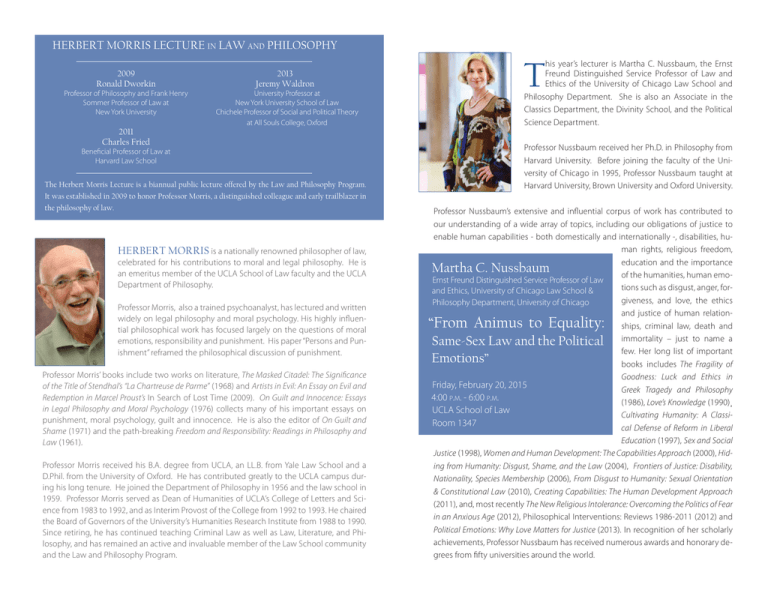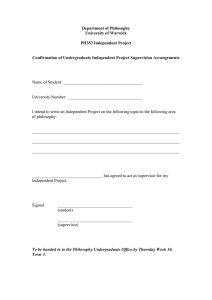T
advertisement

HERBERT MORRIS LECTURE IN LAW AND PHILOSOPHY 2009 Ronald Dworkin 2013 Jeremy Waldron Professor of Philosophy and Frank Henry Sommer Professor of Law at New York University University Professor at New York University School of Law Chichele Professor of Social and Political Theory at All Souls College, Oxford 2011 Charles Fried Beneficial Professor of Law at Harvard Law School The Herbert Morris Lecture is a biannual public lecture offered by the Law and Philosophy Program. It was established in 2009 to honor Professor Morris, a distinguished colleague and early trailblazer in the philosophy of law. HERBERT MORRIS is a nationally renowned philosopher of law, celebrated for his contributions to moral and legal philosophy. He is an emeritus member of the UCLA School of Law faculty and the UCLA Department of Philosophy. Professor Morris, also a trained psychoanalyst, has lectured and written widely on legal philosophy and moral psychology. His highly influential philosophical work has focused largely on the questions of moral emotions, responsibility and punishment. His paper “Persons and Punishment” reframed the philosophical discussion of punishment. Professor Morris’ books include two works on literature, The Masked Citadel: The Significance of the Title of Stendhal’s “La Chartreuse de Parme” (1968) and Artists in Evil: An Essay on Evil and Redemption in Marcel Proust’s In Search of Lost Time (2009). On Guilt and Innocence: Essays in Legal Philosophy and Moral Psychology (1976) collects many of his important essays on punishment, moral psychology, guilt and innocence. He is also the editor of On Guilt and Shame (1971) and the path-breaking Freedom and Responsibility: Readings in Philosophy and Law (1961). Professor Morris received his B.A. degree from UCLA, an LL.B. from Yale Law School and a D.Phil. from the University of Oxford. He has contributed greatly to the UCLA campus during his long tenure. He joined the Department of Philosophy in 1956 and the law school in 1959. Professor Morris served as Dean of Humanities of UCLA’s College of Letters and Science from 1983 to 1992, and as Interim Provost of the College from 1992 to 1993. He chaired the Board of Governors of the University’s Humanities Research Institute from 1988 to 1990. Since retiring, he has continued teaching Criminal Law as well as Law, Literature, and Philosophy, and has remained an active and invaluable member of the Law School community and the Law and Philosophy Program. T his year’s lecturer is Martha C. Nussbaum, the Ernst Freund Distinguished Service Professor of Law and Ethics of the University of Chicago Law School and Philosophy Department. She is also an Associate in the Classics Department, the Divinity School, and the Political Science Department. Professor Nussbaum received her Ph.D. in Philosophy from Harvard University. Before joining the faculty of the University of Chicago in 1995, Professor Nussbaum taught at Harvard University, Brown University and Oxford University. Professor Nussbaum’s extensive and influential corpus of work has contributed to our understanding of a wide array of topics, including our obligations of justice to enable human capabilities - both domestically and internationally -, disabilities, human rights, religious freedom, education and the importance Martha C. Nussbaum of the humanities, human emoErnst Freund Distinguished Service Professor of Law tions such as disgust, anger, forand Ethics, University of Chicago Law School & giveness, and love, the ethics Philosophy Department, University of Chicago and justice of human relationships, criminal law, death and Same-Sex Law and the Political immortality – just to name a few. Her long list of important Emotions” books includes The Fragility of Goodness: Luck and Ethics in Friday, February 20, 2015 Greek Tragedy and Philosophy 4:00 P.M. - 6:00 P.M. (1986), Love’s Knowledge (1990)¸ UCLA School of Law Cultivating Humanity: A ClassiRoom 1347 cal Defense of Reform in Liberal Education (1997), Sex and Social Justice (1998), Women and Human Development: The Capabilities Approach (2000), Hiding from Humanity: Disgust, Shame, and the Law (2004), Frontiers of Justice: Disability, Nationality, Species Membership (2006), From Disgust to Humanity: Sexual Orientation & Constitutional Law (2010), Creating Capabilities: The Human Development Approach (2011), and, most recently The New Religious Intolerance: Overcoming the Politics of Fear in an Anxious Age (2012), Philosophical Interventions: Reviews 1986-2011 (2012) and Political Emotions: Why Love Matters for Justice (2013). In recognition of her scholarly achievements, Professor Nussbaum has received numerous awards and honorary degrees from fifty universities around the world. “From Animus to Equality:



